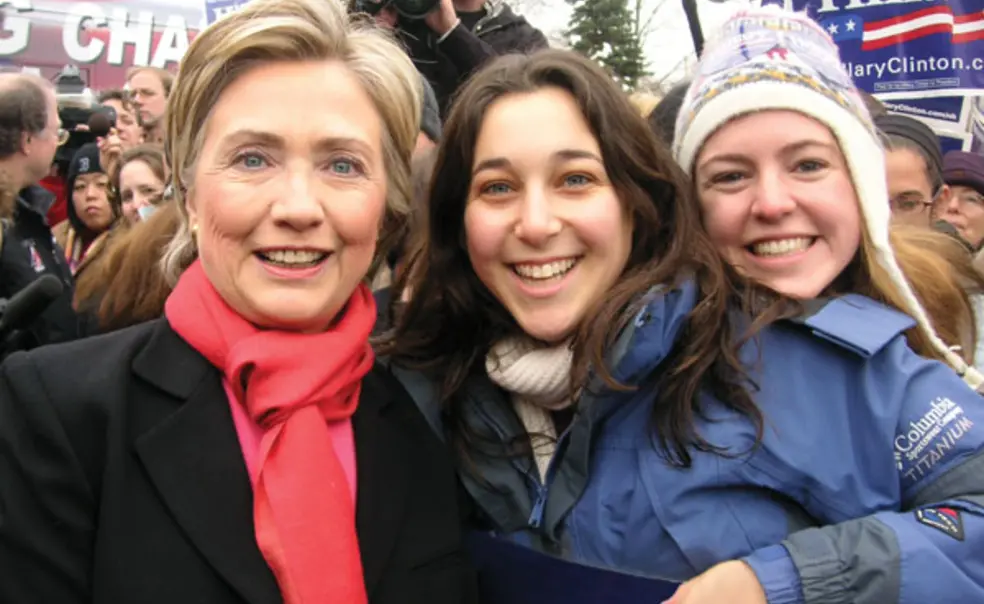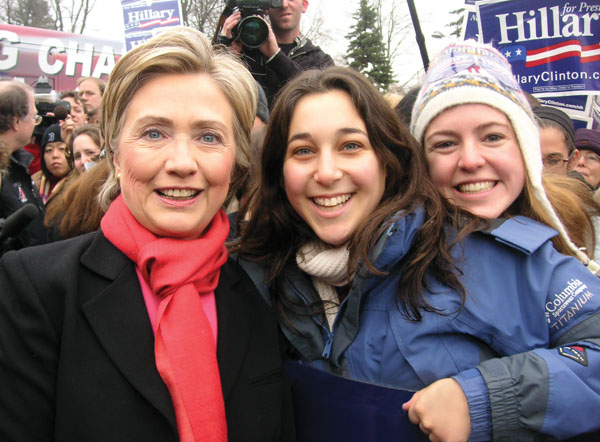At the center of the action as the campaign unfolds
As the presidential primary season moved into high gear last month, Princeton students got a firsthand look at the Iowa caucuses and the New Hampshire primaries.
From attending Sen. Barack Obama’s victory speech in Iowa to canvassing voters on behalf of five different candidates in New Hampshire, undergraduates and graduate students witnessed the political process at work.
Two dozen public-policy graduate students from the Woodrow Wilson School spent two days before the Jan. 3 caucuses in Nevada, Iowa, a sleepy town of 7,000 residents where professors from nearby Iowa State and farmers mingle at local barbecue joints. For a few weeks every four years, however, the national media flock there to cover the Iowa caucuses.
“I went to get a close-up look at the primaries that I have followed from afar for many years,” said Anthony Segal, a first-year master’s student from the United Kingdom who went on the trip. “I got a sense of just how much pride the people [in Iowa] take in being the focus of national attention.”
Tom Niblock, a first-year master’s student at the Wilson School, said that he was already planning on traveling to Nevada — his hometown — for the caucuses when some classmates expressed interest in accompanying him. Niblock is co-chairman of the Woodrow Wilson Political Network, a nonpartisan student organization dedicated to getting students and alumni involved in politics, and he turned the trip into a group opportunity to observe the political process.
The day before the caucuses, the students attended a dinner discussion with Iowa caucus veterans, including congressmen and party volunteers. Students also attended campaign rallies of prominent candidates, and several witnessed Obama’s victory speech in Des Moines. “I’ve never seen a political rally that excited before,” Niblock said.
Meanwhile, other Princeton students in Manchester, N.H., were gearing up to campaign for the Jan. 8 state primaries.
These students were among 19 undergraduates and grad students sponsored by the Pace Center as part of its civic-engagement initiative. The group spent the week before the primaries working for the campaign of each student’s choice, canvassing votes and working on phone banks while staying in the homes of party volunteers. The students also attended panel lectures on the political process at Saint Anselm College in Manchester. Melissa Harris-Lacewell, associate professor of politics and African-American studies at Princeton, accompanied the students.
“We wanted students to develop a deeper and richer understanding of the specific role of the New Hampshire primary in [political] processes,” said Andrew Seligsohn, the Pace Center’s coordinator for civic-engagement learning and the organizer of the trip.
“I wanted to have some sort of civic engagement in my life, and this was a great opportunity,” said Sunny Khemlani, a psychology Ph.D. student who volunteered for Obama on the trip. “I could engage with fellow students from Princeton and see tons of candidates and rallies in a very short time.”
Khemlani was one of 10 students working on the Obama campaign. Pace volunteers also worked for Sen. Hillary Clinton, Sen. John McCain, Gov. Bill Richardson, and Rep. Dennis Kucinich.
At a post-trip discussion dinner, students compared notes from their respective campaigns: Chris Nenno ’08, who worked for McCain, noted that many people he called asked about immigration; Jacob Aronson ’11 from the Richardson campaign said he spoke with voters about everything from the war in Iraq to mental health; Clinton volunteer Regina Lee ’08 commented on the cynical language with which some voters talked about Clinton.
On the day of the primaries, students from all of the campaigns worked the polls and drove elderly and disabled people to their voting locations.
“The most memorable moment for me was getting a call from our supervisor telling us that Hillary had won the town where we were working by a much larger amount than staffers had predicted,” said Jack Ackerman ’11, a volunteer for the Clinton camp. “The campaign [gave] us personal ownership over our small part of the state, and when the results for our town came out we knew that our hard work had paid off.”













No responses yet